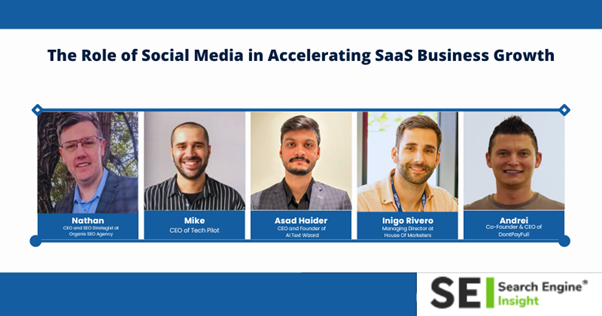Social Media’s Impact on SaaS Growth
Social media has become an indispensable tool for SaaS companies looking to scale their businesses. With the ability to reach millions of users globally, social media platforms offer SaaS companies unique opportunities to build brand awareness, generate leads, and foster customer relationships.
In this article, we’ll explore how social media accelerates SaaS business growth, the best strategies for leveraging it effectively, and the key metrics to monitor for success.
The Role of Social Media in SaaS Business Growth
Building Brand Awareness and Authority
For SaaS companies, building a recognizable brand is crucial. Social media platforms like LinkedIn, Twitter, and Facebook allow businesses to present their brand to a wide audience. By consistently posting relevant content, such as industry insights, product updates, and success stories, SaaS companies can position themselves as thought leaders in their niche. This not only attracts potential customers but also helps retain existing ones by reinforcing the company’s credibility and expertise.
In addition to regular posts, engaging in discussions, participating in relevant groups, and collaborating with influencers can further boost brand visibility. When a SaaS company is seen as an industry leader, it naturally draws more interest from potential customers who are seeking reliable and innovative solutions.
While developing the social media strategy for SaaS companies, the strategy has to fall in line with all business goals,” said Nathan, CEO and SEO Strategist at Organix SEO Agency. He emphasized that starting with a clear understanding of the target audience and their pain points is crucial for creating a strong, relevant presence.
Driving Traffic and Conversions
Social media is a powerful driver of traffic to a SaaS company’s website or landing pages. By sharing compelling content with clear calls-to-action (CTAs), businesses can encourage users to visit their site, sign up for a free trial, or download a resource. Once users are on the site, targeted landing pages optimized for conversions can help turn visitors into leads or customers.
Moreover, social media ads, particularly those on platforms like LinkedIn and Facebook, can be highly effective in driving targeted traffic. These ads can be customized to reach specific demographics, ensuring that your message is seen by the most relevant audience. This targeted approach can lead to higher conversion rates and, ultimately, increased revenue.
“Social media has evolved into a critical engine for SaaS companies, not just in brand visibility but in accelerating business growth,” said Mike, CEO of Tech Pilot. He highlighted the importance of using social media as a direct channel to engage potential customers and build brand credibility.
Strategic Implementation for SaaS Growth
Understanding the Buyer’s Journey
Before crafting a social media strategy, it’s important for SaaS companies to understand the buyer’s journey. This involves identifying the stages that potential customers go through before making a purchase decision: awareness, consideration, and decision. Each stage requires different types of content and engagement strategies.
During the awareness stage, SaaS companies should focus on educational content that addresses the pain points of their target audience. This could include blog posts, infographics, or introductory videos that explain the problem and hint at a solution. As prospects move into the consideration stage, more detailed content such as case studies, whitepapers, or webinars can help them evaluate your product against competitors. Finally, in the decision stage, offering free trials, demos, or personalized consultations can push prospects to choose your solution.
“How social media can be a game-changer for SaaS business growth. Developing a social media strategy that supports growth starts with targeting the right platforms,” said Asad, CEO and Founder of AI Text Wizard. He emphasized the importance of consistency and data-driven refinement in social media strategies.
Developing a Consistent Content Calendar
A successful social media strategy requires consistency. Developing a content calendar helps ensure that your social media efforts are well-planned and executed. The calendar should outline what content will be posted, on which platforms, and at what times. It should also account for important industry events, product launches, and any other key dates relevant to your business.
By planning ahead, SaaS companies can maintain a steady stream of content that keeps their audience engaged. This consistency not only helps build brand recognition but also ensures that your message is reinforced across all touchpoints. Additionally, a well-organized content calendar allows for better resource management, ensuring that content creation and distribution are aligned with broader business goals.
Platform Effectiveness for SaaS Companies
LinkedIn: The Go-To Platform for B2B SaaS
LinkedIn is the most effective platform for B2B SaaS companies due to its professional focus. It’s a place where decision-makers and industry professionals spend time, making it an ideal platform for sharing in-depth content such as case studies, whitepapers, and webinars. LinkedIn’s advanced targeting options also allow SaaS companies to reach specific industries, job titles, and even companies, ensuring that their content is seen by the most relevant audience.
LinkedIn Groups offer another avenue for engagement. By participating in or creating groups related to your industry, SaaS companies can foster discussions, share expertise, and build relationships with potential customers. This not only drives engagement but also positions your brand as an authority in the field.
Twitter: Real-Time Engagement and Customer Service
Twitter’s fast-paced environment makes it ideal for real-time engagement and customer service. SaaS companies can use Twitter to share quick updates, engage in industry conversations, and respond to customer inquiries. The platform’s hashtag functionality also makes it easy to join relevant discussions and increase the visibility of your content.
For SaaS companies, Twitter can also be a valuable tool for tracking industry trends and competitor activities. By monitoring relevant hashtags and participating in Twitter chats, businesses can stay informed about the latest developments in their industry and position themselves as thought leaders.
Lead Generation and Customer Acquisition
Crafting Irresistible Offers
Effective lead generation on social media often involves crafting irresistible offers that provide real value to your audience. This could be in the form of free trials, downloadable resources, or exclusive discounts. For example, a SaaS company could offer a free eBook on best practices in their industry, with the requirement that users provide their email addresses to access it. This not only generates leads but also gives the company an opportunity to nurture these leads through email marketing.
Another powerful approach is to create gated content that addresses specific pain points of your target audience. By offering solutions to their problems, you can build trust and establish your brand as a go-to resource. Once you’ve captured their contact information, you can continue to nurture these leads with personalized content that guides them down the sales funnel.
Running Social Media Ads
Social media ads are a highly effective way to generate leads and acquire customers. Platforms like LinkedIn and Facebook offer advanced targeting options that allow SaaS companies to reach specific demographics, industries, and even job roles. By running targeted ad campaigns, businesses can ensure that their content is seen by the most relevant audience, increasing the chances of conversion.
A successful ad campaign should include a compelling offer, a clear CTA, and an eye-catching design. A/B testing different versions of ads can help determine which performs best, allowing SaaS companies to optimize their campaigns for maximum ROI. Additionally, retargeting ads can be used to re-engage users who have previously interacted with your brand but have not yet converted.
Influencer and Community Engagement
Partnering with Industry Influencers
Influencer marketing can significantly boost the credibility and visibility of a SaaS product. By partnering with industry influencers who have established trust with their followers, SaaS companies can reach a wider audience and gain new customers. Influencers can create content that showcases your product, such as reviews, tutorials, or case studies, and share it with their followers.
It’s important to choose influencers whose audience aligns with your target market. The more relevant the audience, the higher the chances that they will be interested in your product. This can lead to increased sign-ups, conversions, and long-term customer loyalty.
“In my experience as the Managing Director at House Of Marketers, TikTok and Instagram have been instrumental in driving SaaS growth, particularly in the fintech space,” said Inigo Rivero, Co-Founder and Managing Director at House Of Marketers. He emphasized when we executed the campaign for Invoice Fly, we saw incredible results that catapulted the company from a new startup to a serious player in the industry.
Building and Nurturing a Community
Creating a strong online community around your SaaS product can drive growth by fostering customer loyalty and encouraging word-of-mouth marketing. Platforms like Facebook Groups, LinkedIn Groups, or even a dedicated forum on your website can serve as spaces where users can share experiences, ask questions, and provide feedback.
By actively participating in these communities, SaaS companies can build relationships with their customers and gain valuable insights into their needs and preferences. Encouraging user-generated content, such as testimonials, reviews, or success stories, can also help build trust and credibility. Over time, a strong community can become one of your most valuable assets, driving customer retention and organic growth.
Analytics and Strategy Adjustments
Focusing on the Right Metrics
To evaluate the effectiveness of your social media strategy, it’s essential to focus on the right metrics. Engagement rates (likes, shares, comments), conversion rates (how many leads or sales were generated), and customer acquisition costs (how much it costs to acquire a new customer through social media) are key indicators of success. These metrics provide a clear picture of how well your content is resonating with your audience and whether your social media efforts are translating into tangible business outcomes.
Additionally, tracking metrics like follower growth, click-through rates (CTR), and website traffic from social media can provide insights into how well your brand is expanding its reach and attracting new customers. Regularly monitoring these metrics allows SaaS companies to make data-driven decisions and optimize their strategies for better results.
Adjusting Your Strategy Based on Data
No social media strategy is set in stone. As you gather data on your social media performance, it’s important to make adjustments to optimize results. For example, if you notice that certain types of content (e.g., videos, infographics) generate higher engagement, you might consider producing more of that content. Similarly, if certain platforms are driving more traffic and conversions than others, you might allocate more resources to those platforms.
“Social media remains an essential tool for driving innovation, building community, and accelerating growth,” said Andrei, Co-Founder & CEO of DontPayFull. He emphasized that harnessing social media’s power allows SaaS companies to reach a global audience and establish thought leadership.
It’s also important to stay flexible and adapt to changes in the social media landscape. Algorithms, user behaviors, and industry trends can all impact the effectiveness of your strategy. By staying informed and being willing to experiment with new approaches, SaaS companies can continuously improve their social media efforts and drive sustained growth.
Conclusion
In the rapidly evolving world of SaaS, social media stands out as a crucial component for business growth. By leveraging platforms like LinkedIn and Twitter, SaaS companies can build brand awareness, engage with customers, and generate valuable leads. A well-thought-out social media strategy, backed by consistent content and targeted campaigns, can significantly accelerate growth, helping businesses reach new heights.
However, success on social media requires more than just posting regularly. It involves understanding your audience, choosing the right platforms, and continuously analyzing performance metrics to refine your approach. Whether through influencer partnerships, community building, or strategic ad campaigns, the key is to stay adaptable and responsive to the data. As social media continues to shape the SaaS landscape, those companies that effectively harness its power will find themselves leading the charge in this competitive industry.




